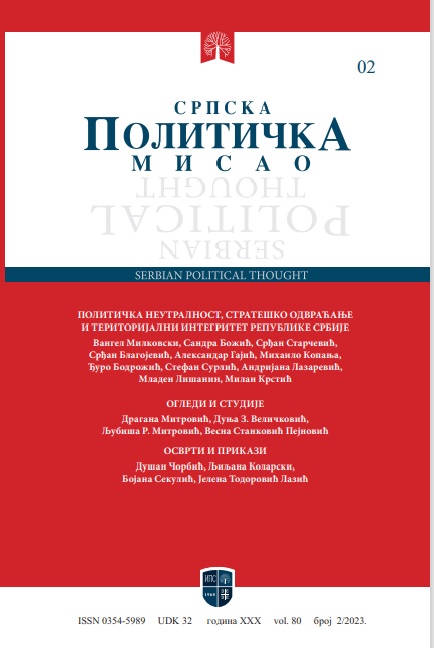GEOPOLITICAL POSITION OF SERBIA AFTER THE BEGINNING OF THE WAR IN UKRAINE: NEUTRALITY AND STRATEGIC DETERRENCE IN A CRISIS CONTEXT
Abstract
The Paper examines the contemporary geopolitical position of the Republic of Serbia after the beginning of the war in Ukraine, with the aim of confirming the hypothesis that even in the new, difficult geopolitical conditions, it is possible to maintain the current policy of military neutrality and increase its own capacities for strategic deterrence. Starting with the geopolitical position of Ukraine in the Eurasian space, the strategies and goals of “Great Powers” in this conflict and the importance that Russia's current military confrontation with the "collective West" is taking in it, the first part of the Paper examines the influence of crisis in East Europe and on Serbia's foreign policy strategy (which, before the beginning of conflict, was moving between neutrality and the "hedging strategy”). Therefore, first part of the Paper gives brief theoretical overlook on foreign policy strategies of small states and their conditioning by geopolitical factor, primarily geopolitical position. With all that taken into consideration, it is easier to have clear overview of Serbia`s current geopolitical position and dilemmas. The second part of the Paper is dedicated to the description of Serbia's contemporary difficult position in the new geopolitical circumstances ("lonely and in the encirclement"), in order to better understand both the numerous challenges to which Serbia is exposed and its foreign policy moves aimed at preserving its military neutrality and the ability for strategic deterrence. On the one hand, Serbia wants to keep up its processes of accession to the EU and to continue to develop the best possible relations with the West and not to confront it and be isolated. On the other hand, Serbia wants to maintain existing relations with the Russian Federation which are of vital interest to Serbia because, as a permanent member of the UN Security Council, Russia is able to prevent the accession of Kosovo and Metohija, the breakaway southern Serbian province, to the United Nations as an independent state. Serbia also wants to preserve the current supply of cheap energy resources for its internal needs from the Russian Federation, because it has no real alternative for them. While remaining military neutral, Serbia also needs to increase its deterrence capabilites: the tightening of relations with certain neighbors increases not only the conflict potential, that is, the possible threat of the use of force, but also requires approaches of using "extended deterrence" with a necessary increase in independent forms of hard, military power, that is, additional investment in increasing one's own combat capacities, which would achieve the maximum achievable deterrence effect. The final considerations in the Paper refer to the geopolitical perspectives of persistence in neutrality, that is, to the confirmation of the basic hypothesis of the Paper on the sustainability of this policy in difficult circumstances.
References
Гајић Александар. 2022. „„Геополитички положај и неутралност малих земаља: пример Србије“, Зборник Неутралност и стратешко одвраћање, Београд: Медија Центар «Одбрана».
Гајић Александар, Рајић Никола. 2022. „Геополитички оквир руске војне интервенције у Украјини“, Политика националне безбедности 1/2022, година, Година XIII, vol. 22, Београд: Институт за политичке студије.
Гајић Александар, Јанковић Слободан. 2012. „Четири стуба српске спољне политике”, у: Зборник Спољна политика Србије и заједничка спољна и безбедносна политика ЕУ, Београд: Институт за међународну политику и привреду.
Дугин Александар. 2004. Основи геополитике, КЊИГА 1, Зрењанин: Екопрес.
Игрутиновић Милан. 2022. „Страх и амбиција:Србија, војна неутралност и стратешко одвраћање“, ,Зборник Неутралност и стратешко одвраћање, Београд: Медија Центар «Одбрана».
Макиндер Халфорд. 2009. Демократски идеали и стварност, Београд: Метафизика.
Новаковић Игор. 2019. „Стална неутралност у Европи и стратешка култура“, Војно дело бр. 8/2019, Београд: Институт за стратегијске студије.
Политика, „Хој Ти: Малигни утицај Русије на Балкану“, Београд, 18.05.2017. https://www.politika.rs/scc/clanak/380861/Hojt-Ji-Maligni-uticaj-Rusije-na-Balkanu приступљено 23.02.2023.
Ратковић Борислав (ур.). 1981. Војни лексикон, Београд: Војноиздавачки завод.
Степић Миломир. 2001. У вртлогу балканизације. Београд: Службени лист.
Степић Миломир, 2004. „Промењивост детерминанти геополитичког положаја српских земаља”, Српско питање – геополитичко питање, Београд: Јантар група.
Степић Миломир. 2012. „О српском геополитичком идентитету“, Српска политичка мисао 2/2012, год. 19 вол. 36, Београд: Институт за политичке студије.
Anastasakis Othon. 2022. „The Russo-Ukrainian Crisis and the Western Balkans: Associations and knock-on effects.ˮACMBriefs. https://ascg.me/wp-content/ uploads/2022/02/ACM-Brief_January-2022-final.pdf
Benchev Dmitar. 2019. Russia’s Strategic Interests and Tools of Influence in the Western Balkans, Riga: NATO StratCom Coe.
Engdahl William. 2010. „Ukraine and a Tectonic Shift in Heartland Power“, 22 March 2010, http://www.globalresearch.ca/ukraine-geopolitics-and-the-us-nato-military-agenda-tectonic-shift-in-heartland-power/18128
Zarić Ivan, Budimir Željko. 2022. “The Great Powers Geopolitical Competition Over the Balkans – The Influence of Ukraine Crisis“,:The Review of International Affairs, Vol. LXXIII, No. 1186, September–December 2022, Belgrade: Institute for International Politics and Economics.
Kolarski Ljiljana, 2022. „The Impact of the War in Ukraine on Western Balkans“, The Policy of National Security, Year XIII, Vol. 23 no. 2/2022, Belgrade: Institute of Political Studies.
Konyvtar Viktor. 2014. Ukraine in Europe (geographical location and geopolitical situation), http://www.mtafki.hu/konyvtar/Ukraine/Ukraine_in_Europe.pdf.
Morgan Patrick. 1983. Deterrence: A Conceptual Analysis, London: Sage Publications.
Rutland Peter. 2015. „Unnecessary War: The Geopolitical Roots of Ukraine Crisis“ У Ukraine and Russia: People, Politics, Propaganda and Perspectives (Ed. Agnieszka Pikulicka-Wilczewska & Richard Sakwa), Bristol: E-International Relations.
Spykman Nicholas. 1944. The Geography of Peace, New York: Harcourt, Brace&Co.
Spykman Nicholas. 1942. America`s Strategy in World Politics: The US and the Balance of Power, New York: Harcourt, Brace&Co.
Friedman George. 2013. “Ukraine: On the Edge of Empires“, Stratfor Weekly, December 17, 2013. https://www.stratfor.com/weekly/20101129_geopolitical_journey_part_6_ukraine
Biljana Vankovska. 2020.“Geopolitics of the Prespa Agreement: Background and After-Effects”, Journal of Balkan and Near Eastern Studies 20 (3), Oxfordshire: Taylor and Francis.
Weber Bodo, Bassuener Kurt. 2014. Western Balkan and the Ukraine Crisis – a changed game for EU and US policies?, DPC Policy Paper, Berlin – Sarajevo: Heinrich Boll Stiftung.

